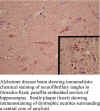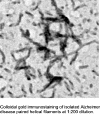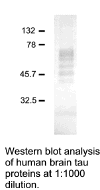Tau
is a heterogeneous group of proteins that range in molecular weight from
50-67 kdal. They are instrumental in the assembly of microtubules and have
been associated with some disease states. In normal brain, tau is
localized in the axons of the neurons, but in some neuropathological
lesions, it accumulates with in the body of the neuron. Tau proteins are
thought to be abnormally phosphorylated in certain disease states and are
found associated with the deposits with the neuron. Tau has been
immunohistochemically localized to neurofibrillary tangles of Alzheimer's
disease (AD).
A goat antiserum to a synthetic peptide that
corresponds to amino acids  1-16 of the N-terminus of the human tau protein
is currently available. This antiserum has been shown to be immunoreactive
with the unconjugated immunizing peptide by ELISA. The antibody has been shown
to immunolabel neurofibrillary tangles and senile plaques in formalin-fixed,
paraffin-embedded Alzheimer's disease brain. The antiserum has also
been shown by immunogold electron microscopy to bind paired helical
filaments, as well as immunolabel
the tau proteins on western blots.
1-16 of the N-terminus of the human tau protein
is currently available. This antiserum has been shown to be immunoreactive
with the unconjugated immunizing peptide by ELISA. The antibody has been shown
to immunolabel neurofibrillary tangles and senile plaques in formalin-fixed,
paraffin-embedded Alzheimer's disease brain. The antiserum has also
been shown by immunogold electron microscopy to bind paired helical
filaments, as well as immunolabel
the tau proteins on western blots. This
antibody should be a valuable tool for scientists working to understand
the role of tau in Alzheimer’s disease.
This
antibody should be a valuable tool for scientists working to understand
the role of tau in Alzheimer’s disease.

This
antiserum was produced using proprietary methodology whereby the peptide
is attached to a carrier that elicits minimal immunoreactivity so that the
antiserum has a higher degree of specificity for the peptide.
Since there is no overwhelming production of interfering antibodies
to the carrier, this antiserum can routinely be used without further
purification. Pseud-Immune™ control
immune serum (Cat no. GPA018E) from a mock immunized animal is available
to be used in conjunction with this antibody as well as the immunizing
peptide (Cat no. HSP024N) which can be used to neutralize immunoreactivity.
Manufacturing
Reference:
Goedert, M., et al.
Neuron 8:159-168, 1992.
 Polyclonal Anti-human
Polyclonal Anti-human